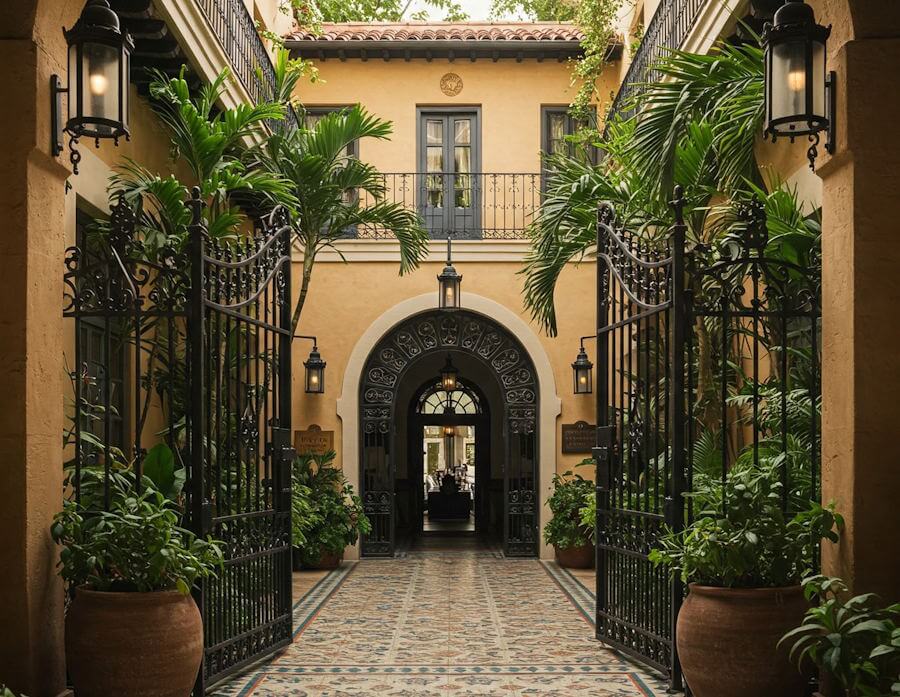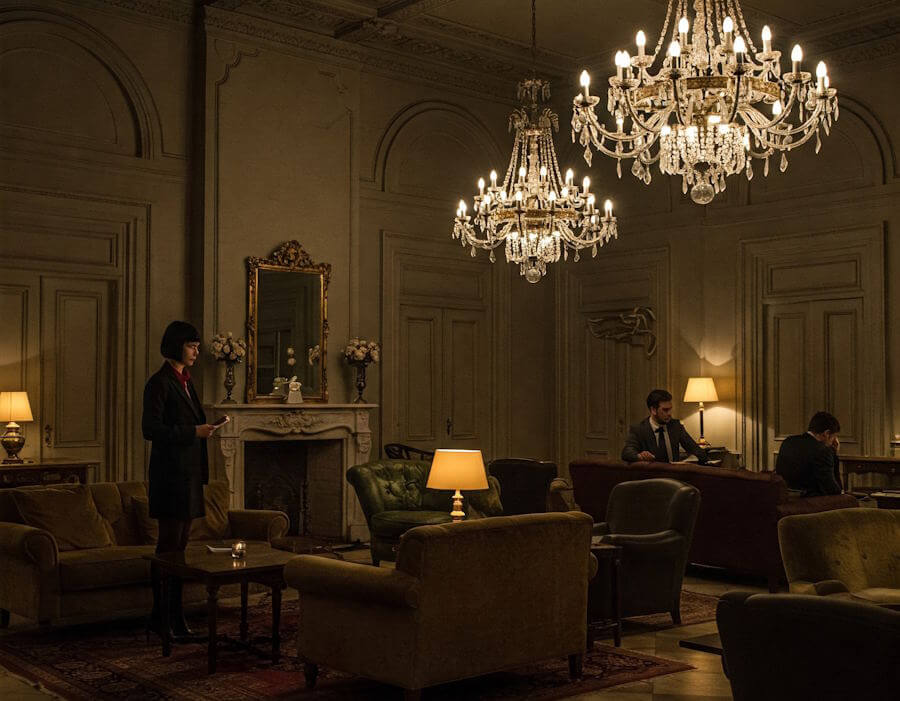Boutique hotels represent a distinctive segment within the hotel market, characterized by their unique charm and individualized approach to hospitality. Unlike traditional hotels, which often prioritize uniformity and standardization, boutique hotels focus on providing a personalized experience tailored to their guests’ needs. These establishments typically range in size from 10 to 100 rooms, contributing to a more intimate atmosphere that fosters connection and engagement between guests and staff.
One of the defining features of boutique hotels is their unique designs. Each boutique hotel often reflects the local culture and aesthetic, incorporating elements that resonate with the surrounding community. This could mean showcasing local art, utilizing regional materials in their construction, or maintaining a historical architecture that pays homage to the area’s past. Such thoughtful design not only enhances the visual appeal of the hotel but also deepens the guest’s connection to the locale, allowing for an enriching experience.
Additionally, boutique hotels pride themselves on delivering exceptional personalized service. Staff members often go above and beyond to ensure that guests feel welcome, providing tailored recommendations for local attractions, dining options, and cultural experiences. This level of attention fosters a warm environment where visitors can immerse themselves in their surroundings, making the hotel not just a place to stay, but a gateway to the local culture.
Overall, boutique hotels stand apart from conventional accommodations through their unique character, personalized service, and commitment to creating an intimate atmosphere. As travelers seek authentic experiences that allow them to connect with new cultures, boutique hotels offer an ideal solution, merging luxury with local identity. Through this exploration, we will delve into how these establishments allow guests to engage with their surroundings on a deeper level.
The Importance of Location
When considering a boutique hotel for accommodation, the significance of location cannot be overstated. Boutique hotels are often strategically situated in vibrant neighborhoods, allowing travelers to effortlessly access cultural landmarks, local markets, and community events. This proximity not only enhances the aesthetic appeal of the hotels but also enriches the overall cultural experience for guests.
Staying in a boutique hotel located within a lively area provides an opportunity for travelers to immerse themselves in the local atmosphere. Such locations typically feature unique architecture and artistic expressions, contributing to a sense of place. These hotels often reflect the cultural fabric of the neighborhood, making it easier for visitors to engage in the local community, interact with residents, and learn about distinctive traditions and customs.
Additionally, many boutique hotels are designed with a commitment to supporting local businesses, which fosters authentic interactions. A hotel situated near local markets allows guests to explore regional delicacies, artisanal crafts, and cultural exhibits, enhancing their travel experience. These interactions serve to deepen one’s appreciation for the destination and promote an understanding of its heritage.
The location of a boutique hotel can also play a crucial role in the convenience and accessibility it offers. Travelers who stay near public transportation nodes or major cultural attractions are more likely to engage in spontaneous explorations, which can lead to memorable adventures off the beaten path. Essentially, the right location functions as a catalyst for experiencing local culture, whether it be through participating in festivals, attending exhibitions, or simply enjoying the vibrancy of city life.
In conclusion, selecting a boutique hotel in a culturally rich and strategically located area enhances the travel experience significantly. By allowing guests to engage more deeply with their surroundings, these hotels serve as gateways to discovering the essence of the local culture.
Design and Aesthetics: A Reflection of Local Culture
Boutique hotels offer a unique lens through which visitors can engage with local culture, and their design and aesthetics play a pivotal role in this experience. These establishments often go beyond traditional hospitality norms, emphasizing individuality and local identity. By incorporating regional art, architectural styles, and culturally relevant materials, boutique hotels craft an immersive environment that resonates with the heritage of their surroundings.
One notable example is the Hotel Figueroa in Los Angeles, which elegantly showcases the city’s rich Mexican heritage. The property features vibrant murals by local artists and utilizes traditional tile work, inviting guests to experience the essence of Los Angeles whenever they step into the hotel. This attention to detail not only enhances the visual appeal but also fosters a deeper connection between guests and the locale.
In another context, the Maradiva Villas Resort and Spa in Mauritius reflects the island’s lush natural environment and cultural diversity through its design. The use of thatched roofs and local stone materials helps to harmonize the villas with their tropical surroundings. Additionally, elements of Creole architecture are seamlessly integrated, celebrating the rich cultural tapestry of the region. This approach not only creates visually striking accommodations but also roots the guest experience in the authenticity of Mauritius.
Furthermore, many boutique hotels take pride in sourcing local artisan crafts, infusing their spaces with handmade furnishings and decor that tell a story of the region. The Hotel at the Waldorf Astoria in Beverly Hills, for instance, highlights California’s artistic legacy with curated pieces from local artisans, thus forging a stronger bond between the hotel and its cultural milieu. Through such design philosophies, boutique hotels serve as ambassadors for local culture, inviting guests to not only observe but truly experience the destination.
Personalized Experiences and Local Connections
Boutique hotels stand out in the hospitality industry by offering unique, personalized experiences that connect guests to the rich local culture of their surroundings. The emphasis on local authenticity allows travelers to immerse themselves in the community, fostering a deeper understanding of customs, traditions, and culinary delights. A quintessential example of this is the curated tours that boutique hotels often organize, which provide guests with the opportunity to explore hidden gems of the area alongside knowledgeable local guides. These tours can include visits to historical sites, art districts, and beloved local eateries, ensuring that travelers experience the destination beyond the typical tourist attractions.
Furthermore, many boutique hotels offer cooking classes with local chefs, which not only teach guests how to prepare traditional dishes but also provide a platform for cultural exchange. Participants have the chance to engage in conversations regarding local ingredients, culinary history, and even personal anecdotes shared by the chefs, creating a rich tapestry of cultural connection. This hands-on approach not only enhances culinary skills but also deepens the appreciation for the region’s gastronomical heritage.
Another noteworthy aspect is the collaborations boutique hotels establish with nearby artisans, such as craftspeople and artists. By showcasing these local talents within the hotel, guests can gain insight into various art forms and crafts that represent the region’s identity. Whether it’s through workshops where guests can try their hand at pottery or showcasing local artwork in the hotel’s decor, these interactions promote a sense of community and support for local artisans while enriching the overall guest experience.
Such tailored experiences provided by boutique hotels highlight the importance of personal connections and local insights, ultimately facilitating a more enriching and meaningful stay for travelers eager to explore the cultural fabric of their chosen destination.
Sustainable Practices and Cultural Preservation
In recent years, boutique hotels have emerged as significant players in the realm of sustainable tourism, often emphasizing practices that not only respect the environment but also celebrate local culture. These hotels frequently prioritize eco-friendly initiatives that promote environmental sustainability, while simultaneously employing methods to preserve the unique cultural fabric of their destinations. One fundamental aspect of this commitment is the sourcing of local materials. Many boutique hotels are designed using locally sourced building materials, which not only minimizes the environmental impact associated with transporting goods but also reflects the architectural styles and heritage of the region.
A crucial component of fostering sustainability in boutique hotels is the support of local businesses. By partnering with nearby artisans and suppliers, these establishments significantly contribute to the local economy. This can include sourcing in-room amenities from local craftspeople or serving regional cuisine in their restaurants. These practices not only benefit the local community but also enrich the guest experience, allowing visitors to engage more deeply with the culture and traditions of the area. For instance, a hotel situated in a coastal town might feature local seafood dishes prepared according to traditional recipes, providing guests with an authentic culinary experience that highlights the region’s identity.
Implementing eco-friendly practices is another way in which boutique hotels contribute to cultural preservation. Many hotels adopt renewable energy sources, waste reduction programs, and water conservation measures, which minimize their ecological footprint. Such efforts not only enhance the sustainability of the hotel itself but also set a precedent for responsible tourism, encouraging guests to adopt similar values during their stay and beyond. By fostering an environment where sustainability and cultural appreciation coexist, boutique hotels play a pivotal role in ensuring that local traditions and practices are honored and maintained for future generations.
Culinary Experiences: Taste of the Region
One of the most compelling features of boutique hotels is their commitment to providing authentic culinary experiences that reflect the local culture. Unlike large chain hotels, boutique accommodations often embrace their surroundings, presenting guests with opportunities to savor the unique flavors of the region. These culinary offerings range from on-site restaurants that showcase regional ingredients to curated food tours that introduce guests to local eateries and dining traditions.
Many boutique hotels partner with renowned local chefs to create menus that highlight the distinctive culinary heritage of the area. These collaborations often result in innovative dishes crafted from fresh, seasonal produce, local meats, and seafood. Guests can enjoy meals that not only satisfy their palate but also tell a story of the landscape and history surrounding them. Such dining experiences can serve as an education in local customs, as chefs often share the origins and preparation methods of the dishes served.
Moreover, some boutique hotels offer cooking classes and interactive workshops, allowing guests to dive deeper into the region’s culinary landscape. These activities can encompass anything from traditional cooking techniques to the preparation of signature local dishes. As participants engage in the cooking process, they gain an appreciation for the ingredients and cultural significance behind each dish, fostering a more intimate connection to the region’s culinary identity.
In addition to in-house dining, boutique hotels frequently provide curated food tours that guide guests through the culinary scene. These tours may include visits to local markets, tastings at beloved street vendors, or stops at family-owned restaurants. Each experience immerses guests in the local food culture, promoting not just gastronomic enjoyment but also cultural understanding.
Stories from Boutique Hotel Owners
Boutique hotels have become more than just places to stay; they are reflections of the local culture and community. Owners of these unique establishments often have compelling stories that illustrate their passion for preserving and promoting their regional heritage. One such owner, Maria, operates a quaint boutique hotel nestled in the heart of a historic district. During an interview, she expressed her deep ties to the community, stating, “Our aim is to showcase the rich history of our area through every aspect of our hotel. From the design details to the locally sourced breakfast items, we strive to offer an authentic experience that connects our guests with the essence of our culture.”
Another boutique hotelier, James, focuses on sustainability and community engagement. His hotel features locally crafted furniture and art from regional artists, emphasizing the importance of supporting local talents. “I believe that our guests should not only enjoy their stay but also gain insights into the local way of life,” James shared. His commitment extends to organizing community events, such as farmer’s markets and cultural festivals, allowing visitors to immerse themselves in the local culture.
Many boutique hotel owners, like Claire, also prioritize storytelling. Claire runs a boutique hotel in a small coastal town and incorporates narratives into the guest experience. “Each room tells a story,” she explains, pointing to the unique decor that reflects the town’s maritime history. Claire’s approach not only honors local traditions but also engages travelers in a dialogue about their surroundings.
The commitment of boutique hotel owners to highlight cultural narratives enriches the traveler’s experience. By sharing personal stories and engaging with the community, these hoteliers create an environment where guests can genuinely connect with the local culture, making their stay memorable and meaningful. This emphasis on authentic experiences is what distinguishes boutique hotels from traditional accommodations.
Cultural Events and Activities Nearby
Boutique hotels are often strategically located in vibrant neighborhoods that serve as gateways to rich cultural experiences. One of the most significant ways these accommodations engage guests with local culture is by promoting nearby cultural events and activities. From local festivals celebrating indigenous traditions to art walks that showcase the creativity of local artists, boutique hotels often act as information centers, curating comprehensive guides to enhance the visitor experience.
Many boutique hotels collaborate with local event organizers, galleries, and cultural institutions to provide exclusive access to events, such as gallery openings, theater performances, and food fairs. These partnerships not only benefit the hotels but also help to support and promote local artisans and businesses, creating a mutually beneficial relationship within the community. Guests can often find a list of recommended activities in hotel lobbies or through personalized concierge services, which can range from guided city tours to tickets for cultural exhibits.
Seasonal festivals, such as music or film festivals, are frequently highlighted due to their ability to draw both locals and tourists, creating an atmosphere of shared cultural appreciation. Art walks may offer not just an exploration of visual arts, but also poetry readings, live music, and interactive workshops that invite guest participation. Such events serve as platforms for guests to immerse themselves in the local culture, fostering connections that might lead them to return in the future.
Furthermore, many boutique hotels actively host their own cultural events, such as pop-up markets showcasing local crafts or culinary experiences featuring indigenous cuisine. By creating these opportunities for interaction, boutique hotels enrich the visitor experience and enable guests to forge a deeper connection with the local culture. In summary, through engaging with cultural events and activities, boutique hotels effectively position themselves as integral players in the promotion and celebration of local culture.
Conclusion: The Future of Boutique Hotels in Cultural Exploration
As the landscape of travel continues to evolve, boutique hotels have emerged as vital facilitators in the quest for authentic cultural experiences. Unlike conventional accommodations, these unique establishments often serve as gateways to local traditions, customs, and everyday life. Guests seeking a meaningful connection with their destination increasingly turn to boutique hotels, which are designed to reflect the history, art, and character of their surroundings. This shift in traveler preferences underscores the growing importance of boutique hotels in the broader cultural ecosystem.
The appeal of immersive cultural experiences is influencing traveler behavior, particularly among millennials and Generation Z, who prioritize meaningful interactions over surface-level tourism. Boutique hotels, with their bespoke services and locally-inspired designs, are adept at curating experiences that resonate on a personal level. This allows them to stand out in a crowded hospitality market, offering not only a place to stay but also opportunities for exploration and engagement with the local community.
Moreover, these establishments often take a proactive approach in fostering relationships with local artisans, craftsmen, and tour guides. By integrating such partnerships, boutique hotels enhance the guest experience while simultaneously supporting the local economy. As travelers show a preference for journeys that enrich their understanding of diverse cultures, the role of boutique hotels becomes ever more pronounced. They are poised to facilitate cultural exchange not just for the sake of tourism, but as a means of promoting social and economic sustainability in the communities they inhabit. In conclusion, the future of boutique hotels lies in their ability to provide transformative experiences that encourage connections between visitors and the vibrant cultures they encounter.




